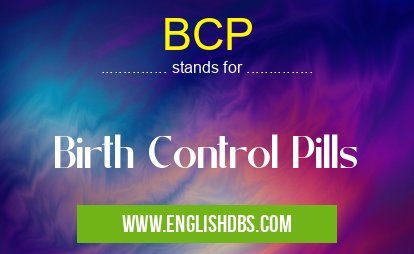What does BCP mean in PHYSIOLOGY
BCP is an acronym for Birth Control Pills, a form of contraception also known as oral contraception. The term “birth control” refers to medications, devices, or procedures used to prevent pregnancy. BCPs contain synthetic versions of hormones like estrogen and progestin that prevent ovulation, fertilization of an egg, or implantation in the uterus. They are one of the most popular methods of birth control because they are safe, often free or low cost, and easily reversible when desired.

BCP meaning in Physiology in Medical
BCP mostly used in an acronym Physiology in Category Medical that means Birth Control Pills
Shorthand: BCP,
Full Form: Birth Control Pills
For more information of "Birth Control Pills", see the section below.
» Medical » Physiology
What They Are
BCPs are small tablets taken daily over three-week periods with a one-week break in between. Each pack contains 28 pills in total; 24 containing varying doses of hormones while the other 4 pills are placebo (not containing any active ingredients). When taken as directed by a health care provider, BCPs are 99% effective at preventing pregnancy and can also help reduce symptoms of premenstrual dysphoric disorder (PMDD), acne, endometriosis, and pelvic inflammatory disease (PID).
Risks & Benefits
Taking BCPs does not protect against sexually transmitted infections (STIs) such as HIV/AIDS; therefore it is important to use condoms or another barrier protective method in addition to taking BCPs. Some risks associated with taking BCPs include blood clots and an increased risk for stroke or heart attack in some women. Other potential side effects may include weight gain, headaches/migraines, nausea/vomiting, irregular bleeding/spotting between periods and depression. However, there are many benefits associated with using birth control pills including lighter periods with less cramps and pain; reduced risk for certain types of cancer (ovarian cancer); help regulate menstrual cycles; improved acne; decreased PMS symptoms; better mood stability and more predictable periods.
Final Words:
Birth Control Pills are one of the safest and most effective forms of contraception available today. They provide reliable protection against pregnancy when taken as directed while also providing several beneficial short-term side effects such as improving acne and reducing menstrual discomfort. For those looking for reliable protection against unintended pregnancies that do not want to use a long-term contraceptive device such as an IUD or implant, BCPs may be a great option worth considering after speaking with your healthcare provider about possible risks associated with their use.
BCP also stands for: |
|
| All stands for BCP |
